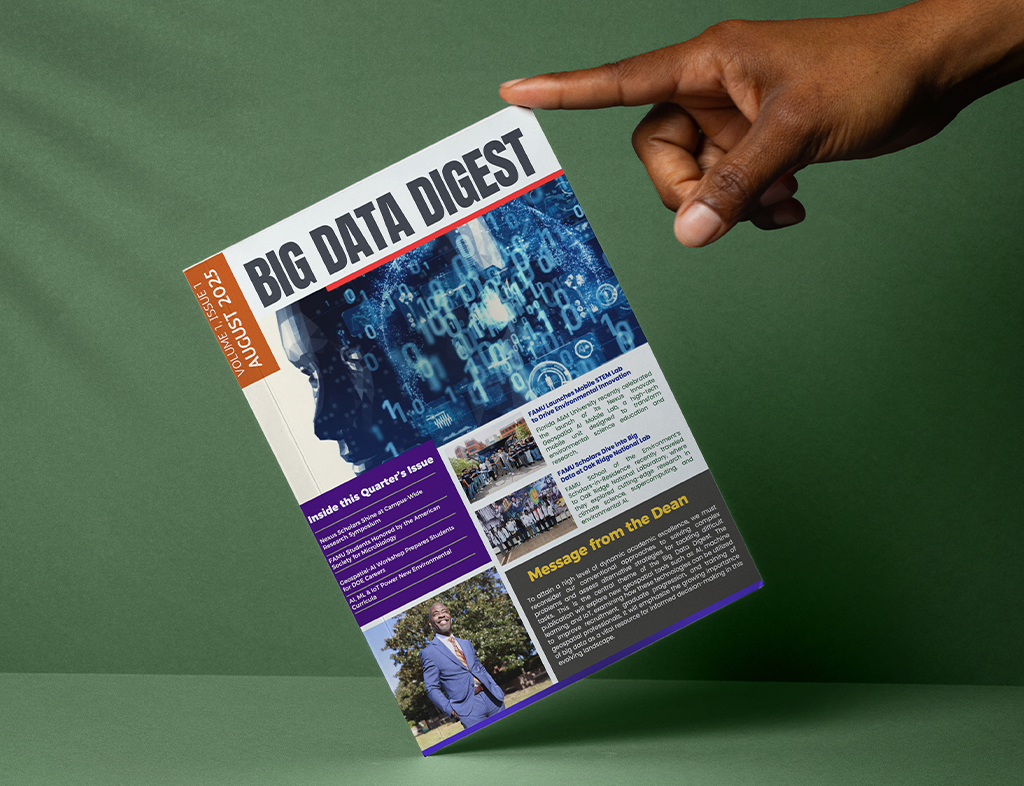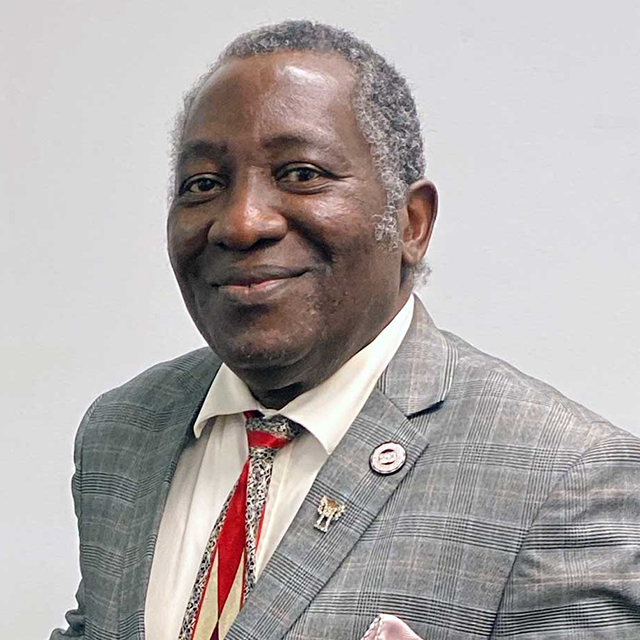Geospatial Artificial Intelligence Enhanced Curriculum for Minority Serving Institutions (GAEC-MSI)
FAMU’s GAEC-MSI focuses on integrating AI and geospatial tools into the curriculum, preparing students for careers in environmental sciences and bioinformatics.
At FAMU School of Environment, we care about using big data to ensure sustainable environmental outcomes.
-

ABOUT GAEC-MSI
The GAEC-MSI will integrate new geospatial tools (AI, machine learning, and IoT) to address emerging areas in environmental engineering, bioinformatics, remote sensing, and geospatial science to grow and strengthen recruitment and graduate progression and training of geospatial professionals in an area of strategic emphasis in science, technology, engineering, and mathematics (STEM).
The curriculum enhancement is transdisciplinary with a cadre of scientists and researchers led by Victor Ibeanusi, Ph.D. FAMU-Dean School of the Environment in partnership with Kentucky State University and Clark Atlanta University. -

OUR MISSION
In an era of climate-induced environmental changes, finding innovative solutions to these challenges will depend on building a highly skilled and diverse workforce.
Geospatial AI is a digital brain trust focusing on the integration of new geospatial tools (AI, machine learning, and IoT)) to better address emerging areas in environmental engineering, bioinformatics, remote sensing, and geospatial science.
Our goal is to increase and strengthen recruitment and training of geospatial professionals.
|
|
|
|
Curriculum Innovation The intricate nature of environmental data presents considerable challenges for industry professionals. By equipping prospective and current environmental science students with training in cutting-edge software solutions and advanced AI methodologies, we can effectively convert real-world information into actionable insights. This includes examples like using Machine Learning (ML) and Computer Vision technologies to handle complex datasets detect illegal landfills through UAV imagery and video analysis or using AI tools to evaluate and forecast water quality. |
Workforce Development In addition to transforming current environmental science curriculum with these emerging
technologies, we believe exposing students earlier to this contributes to developing
a more robust pipeline of qualified talent for careers in environmental sciences.
|
Faculty Training
Geospatial AI comprises faculty from multi-institutions and interdisciplinary academic fields, each with robust experience and expertise in transdisciplinary research and training, including geospatial data management, remote sensing, AI, and IOT, etc. These faculty members will collaborate with committed partners to integrate innovative research and education into innovative, contemporary, inclusive training to develop next generation graduates and future workforce fully capable of addressing pressing national needs in the DOE domains
Victor Ibeanusi, Ph.D.; Dh.c. (Honoris causa) is the Founder of the EnergyWaterFoodClimateNexus (EWFCN), a new science enterprise aimed at sustainable solutions for safe water, sustainable energy, food security, and climate resilience to expand the research frontier for new discoveries to the vexing challenges on our environment. [READ MORE...]
Lorem ipsum dolor sit amet, consectetur adipiscing elit. Aenean euismod bibendum laoreet.Lorem ipsum dolor sit amet, consectetur adipiscing elit. Aenean euismod bibendum laoreet.
Dr. Olugbemiga (Olu) Olatidoye is a Professor of Engineering and the Founder and Director of the Visualization, Simulation and Design Laboratory (ViSiDeL) - A Virtual Reality Lab at Clark Atlanta University (CAU). [READ MORE...]
Current Issues
This proposal highlights the value of intelligent novel spatial applications, complex data, and science-based decision-making capabilities for long-term ecosystem monitoring and restoration.
IoT devices can assist in data collection and monitoring in the field of bioinformatics.
For instance, IoT sensors can capture data from soils, plants and wildlife habitats,
to allow assessment of spatial and temporal patterns and changes. This data, when
combined with geospatial tools, can aid in cleanup activities, ecological research,
conservation efforts, and understanding the impact of environmental changes on biodiversity.
This curriculum will complement an existing concentration in the existing BS degree in Environmental Science offered in the School of the Environment. There are presently 5 Concentration areas for the BS in Environmental Science:
➜ Sustainability Science;
➜ Environmental Toxicology-Risk Assessment;
➜ Environmental Monitoring and Instrumentation;
➜ Environmental Restoration and Waste management;
➜ and Environmental Policy.
This new concentration area differs from these by focusing on the gathering and analysis of spatial data for a variety of environmental applications and related areas such as agriculture, natural resource management, and land use planning. Existing tracks do not include training in spatial analysis of large data sets, or acquisition of data by remote sensing, including drones, aircraft and satellite platforms. The new concentration area will include specialized training in geospatial science, remote sensing theory and methodology relative to applications in environmental science.
The curriculum in remote sensing will enable students to:
✔️ Explore utility of cloud-based geospatial environments (e.g., Google Earth Engine, Microsoft Azure- AI for Earth program) for cost-effective remote sensing and geospatial analysis.
✔️ Assist with development of landscape scale hydrologic assessments including processing of airborne LiDAR data and products for use in hydrologic models.
✔️ Development of novel, cost-effective techniques to monitor ecological and hydrologic change across relevant space and time scales within the Apalachicola region and Gulf coastal plain.
✔️ Explore utility of Drone Laser Scanning and Structure from Motion (SfM) techniques
to develop point clouds and related ecosystem and hydrologic structure products using
overlapping imagery from UAVs/drones, aircrafts and satellites.
✔️ Participate in the development of a regional geospatial decision support system (DSS)
to assess and prioritize ecological and hydrologic restoration needs.
BIG DATA DIGEST: VOL. 1, ISSUE 1 📰

- Explore Big Data Digest: Volume 1, Issue 1 and see how FAMU students and faculty are leading the way in big data, and hands-on
research.
Explore The Big Data Digest Newsletter
|
|
Events |
|
|
|
Stay connected with all the exciting events happening. Don't miss out on opportunities to engage, learn, and network! |
|

The FAMU School of the Environment is always preparing new events and workshops focused
on engagement, discovery, and real-world impact.
Check back soon for exciting opportunities.
|
|
|

|
|







